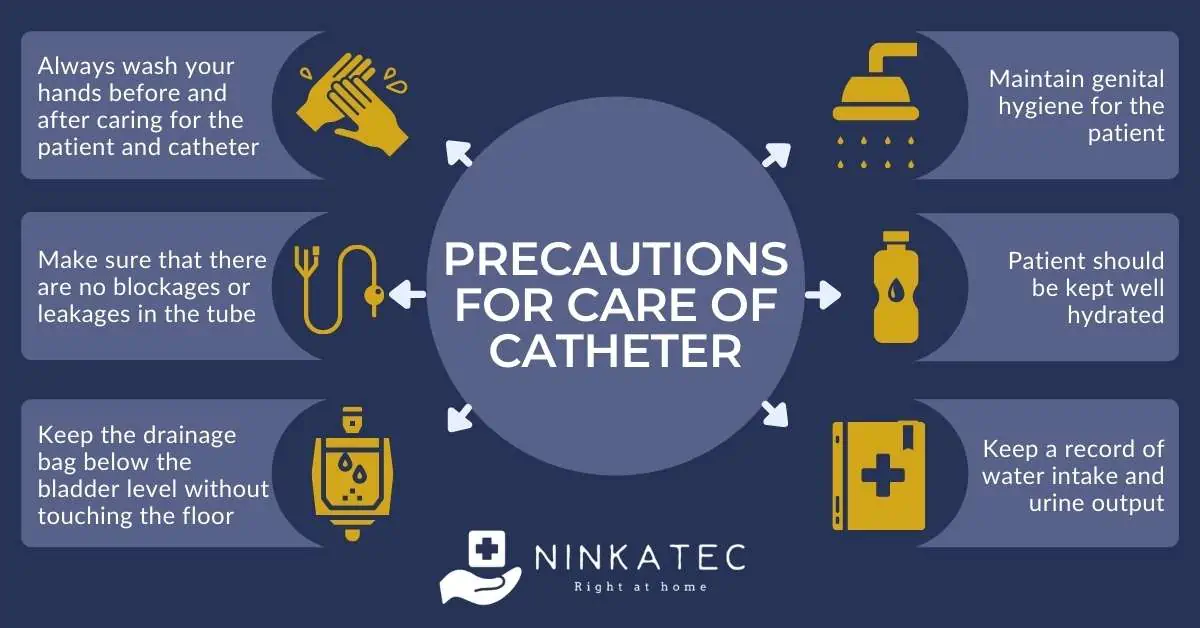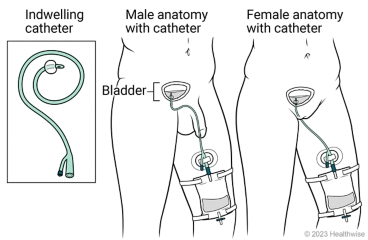
How to Become a Catheter Care Expert: Essential Guide
Becoming a catheter care expert can open doors to a rewarding career in healthcare. Imagine the impact you can have by ensuring comfort and safety for patients who rely on catheters.
Your expertise can make a real difference in their lives, providing them with the dignity and care they deserve. If you’re eager to learn how to master this essential skill, you’re in the right place. This guide will equip you with the knowledge and confidence you need to excel.
Keep reading to discover how you can become a trusted professional in catheter care, making a meaningful contribution to patient well-being every day.

Understanding Catheters
Becoming skilled in catheter care involves understanding proper hygiene and handling techniques. Training focuses on infection prevention and patient comfort. Hands-on practice and guidance from healthcare professionals are essential for mastering these skills.
Understanding catheters is essential for anyone interested in catheter care. Catheters are medical devices used for various purposes. They help in draining fluids or administering medication. Knowing their types, materials, and common myths is vital. This knowledge ensures safe and effective catheter care.
Types And Uses
Catheters come in different types with specific uses. Urinary catheters help drain urine from the bladder. They are common in hospitals and home care. Another type is the central venous catheter. It allows the delivery of medication directly into the bloodstream. Peripheral catheters are smaller and used for short-term treatments. They are often used for delivering fluids or medications. Each type serves a unique purpose in medical care.
Materials And Design
Catheters are made from various materials. Common materials include silicone, latex, and polyurethane. Silicone catheters are flexible and comfortable. They are often used for long-term catheterization. Latex catheters are more affordable but may cause allergies. Polyurethane catheters are strong and durable. The design of catheters ensures they meet medical needs. They are designed to minimize discomfort and maximize efficiency.
Common Myths
Many myths surround catheter use and care. One myth is that catheters are always painful. In reality, proper insertion minimizes pain. Another myth is that catheters always cause infections. With proper hygiene, infection risks are low. Some believe catheters limit mobility. Many patients can still move with care. Understanding these myths helps in providing better catheter care.

Core Skills For Catheter Care
Becoming proficient in catheter care requires mastering several core skills. Each skill ensures patient safety and comfort. These skills also help prevent infections and complications. The core skills include hygiene practices, insertion techniques, and monitoring and maintenance. Mastering these skills can significantly enhance patient well-being.
Hygiene Practices
Proper hygiene is crucial in catheter care. Always wash hands thoroughly before handling a catheter. Use clean gloves to reduce infection risks. Sterilize all equipment before use. Ensure the catheter site is clean and dry. Regularly check for any signs of infection.
Insertion Techniques
Mastering insertion techniques is essential. Follow guidelines for safe catheter insertion. Ensure the correct catheter size for each patient. Lubricate the catheter to ease insertion. Insert it gently to avoid discomfort or injury. Confirm correct placement to ensure proper function.
Monitoring And Maintenance
Regular monitoring is vital for effective catheter care. Check for any blockages or leaks. Ensure the catheter is properly secured. Replace the catheter as needed to avoid complications. Monitor the patient for any signs of discomfort. Maintain a detailed record of care provided.
Preventing Complications
Preventing complications is crucial in catheter care. Proper hygiene and vigilance ensure a smoother experience. Addressing common issues early helps maintain health and comfort. Below, we explore key strategies to avoid complications.
Recognizing Infections
Infections are a major concern with catheters. Look for redness or swelling around the site. Unusual odors can also signal infection. Consistent fever or chills might indicate trouble. Prompt action is essential. Consult a healthcare professional if symptoms arise.
Dealing With Blockages
Blockages can disrupt catheter function. Ensure the catheter is properly positioned. Check for kinks or twists in the tubing. Regularly flush the catheter with prescribed solutions. Stay hydrated to help prevent blockages. Seek help if urine flow decreases.
Managing Discomfort
Discomfort can occur during catheter use. Adjust the position for better comfort. Ensure the catheter is securely in place. Use cushions or pads to reduce irritation. Monitor for signs of pain or burning. Discuss persistent issues with a healthcare provider.
Patient Communication
Effective patient communication is at the heart of catheter care. Building trust and understanding with patients can transform their experience and facilitate smoother procedures. Communicating effectively with patients isn’t just about relaying information; it’s about connecting with them on a personal level. Let’s break down how you can improve your communication through empathy, clear explanations, and addressing concerns.
Empathy And Support
Empathy is a powerful tool in catheter care. Imagine yourself in the patient’s shoes; how would you feel? Offer your support by listening actively and showing genuine concern for their feelings. A simple gesture like asking how they are doing can open the door to meaningful interactions.
Support goes beyond words. If a patient seems anxious, reassure them with your presence. Share a personal story of helping a patient feel at ease, emphasizing the importance of emotional comfort. Your empathy can make a significant difference in their experience.
Explaining Procedures
Clear explanations are crucial for patient understanding. Break down catheter procedures into simple steps they can follow. Use straightforward language and avoid medical jargon that may confuse them.
Visual aids can enhance understanding. Consider using diagrams or models to illustrate the process. Ask yourself, how can you make this information accessible and relatable? A patient who understands what to expect is less likely to feel anxious.
Addressing Concerns
Addressing concerns is a vital part of patient communication. Encourage patients to voice their worries, no matter how small. Be attentive and respond thoughtfully to each concern.
Take time to clarify any misconceptions they might have. Share an experience where addressing a simple concern changed a patient’s perspective. Do you notice patterns in patient concerns? Use these insights to improve your communication strategy and provide reassurance.
Effective patient communication requires practice and sensitivity. How will you adapt your approach to better serve your patients? The answers lie in your willingness to listen, explain, and support them throughout their care journey.
Advanced Training And Certification
Learn catheter care through advanced training and certification. Courses cover safety, procedures, and hygiene. Enhance skills with hands-on practice and expert guidance.
Advanced training and certification in catheter care can significantly boost your career prospects and enhance your skills. Whether you’re a healthcare professional looking to specialize or someone new to the field, pursuing advanced training can set you apart. This section explores the key areas of advanced training, including courses, certification programs, and continuing education.
Courses And Workshops
Courses and workshops offer hands-on experience, which is invaluable. Imagine attending a workshop where you can practice catheter insertion under expert guidance. These sessions often include real-world scenarios, ensuring you’re prepared for anything that comes your way. Workshops are a great place to ask questions and clarify doubts. You interact with instructors and peers, which makes learning engaging. Many professionals find that workshops help them connect theory with practice effectively.
Certification Programs
Certification programs validate your expertise and commitment to quality care. These programs usually involve a comprehensive curriculum covering various aspects of catheter care. Successful completion results in a certification that can be a significant advantage in the job market. Consider programs accredited by reputable organizations. They not only equip you with knowledge but also enhance your credibility. Certification can open doors to advanced roles and responsibilities in healthcare settings.
Continuing Education
Continuing education is crucial in keeping your skills up-to-date. Medical techniques and protocols evolve, and staying informed is essential. Many institutions offer online courses, making it convenient to learn at your own pace. Engage in webinars, seminars, and online courses that focus on the latest advancements. Reflect on your learning and apply it to your daily practice. Have you ever thought about how staying updated can impact patient outcomes and your career growth? By participating in advanced training, you not only improve your skills but also contribute to a higher standard of patient care. Are you ready to take the next step in your professional journey?
Tools And Resources
Embarking on a journey to become skilled in catheter care requires more than just a desire to help others. It’s about having the right tools and resources at your disposal to ensure safety, efficiency, and comfort for the individuals you are assisting. Whether you are a healthcare professional or a caregiver, understanding the essential equipment, tapping into online communities, and utilizing reference materials are crucial steps in mastering catheter care.
Essential Equipment
The cornerstone of effective catheter care lies in the equipment you use. Start with quality catheters that are suitable for the specific needs of your patients. It’s not just about having a catheter; it’s about having the right type and size.
Consider investing in sterile gloves, antiseptic wipes, and securement devices. These tools ensure hygiene and prevent infections. A well-equipped supply kit can make your job easier and more efficient.
Do you have a checklist of equipment ready before each procedure? It might be time to create one. This small step can significantly enhance your preparedness and confidence.
Online Communities
Joining online communities can offer a wealth of knowledge from people who have walked the path before you. Platforms like Reddit or specialized medical forums are teeming with advice and shared experiences.
Engage with groups that focus on catheter care. Ask questions, share insights, and get support. You might discover tips and tricks that aren’t found in textbooks.
Have you ever considered online webinars? They are often led by experts and can provide valuable updates on best practices. Staying connected with a community can be your secret weapon in mastering catheter care.
Reference Materials
Books and manuals on catheter care are indispensable. They provide detailed procedures and safety protocols. The insights from comprehensive guides can complement your practical experience.
Consider subscribing to medical journals that regularly publish articles on catheter care advancements. They can keep you informed about new techniques and equipment.
Do you have a favorite reference book or article? Revisit it periodically. Sometimes refreshing your memory can bring new clarity to old information.
Equipping yourself with the right tools and resources not only aids in your learning but also ensures you provide the best care possible. Are you ready to take the next step in your catheter care journey?
Staying Updated
Staying updated in catheter care involves learning new techniques and understanding best practices. Regular workshops and online courses provide valuable insights. Keep up with medical journals for the latest advancements.
Staying Updated in the field of catheter care is essential for providing the best patient care and advancing your career. The healthcare industry is constantly evolving, and catheter care is no exception. By staying informed about the latest developments, you can ensure that your skills remain relevant and effective. Let’s explore how you can keep yourself updated through research, networking, and professional journals.
Research And Innovations
Research is the heartbeat of medical progress. As a catheter care specialist, it’s important to keep an eye on new studies and breakthroughs. Look for reputable sources that share recent innovations in catheter care techniques. Consider attending workshops or seminars that focus on the latest research findings. These events can provide practical insights that you can apply in your daily practice.
Networking Opportunities
Building a strong network can open doors to valuable information. Join professional groups or online forums where catheter care professionals discuss challenges and solutions. Share your experiences and learn from others to stay ahead of industry trends. Connecting with peers can provide you with tips that are not easily found in books or articles.
Professional Journals
Professional journals are treasure troves of knowledge. Subscribe to journals that publish articles on catheter care. These journals often feature case studies and reviews that can deepen your understanding of current practices. Reading them regularly can sharpen your skills and introduce you to techniques you might not have considered before. Consider this: How can you ensure you’re not missing out on vital updates? Staying informed requires effort, but the rewards of being a knowledgeable and skilled professional are well worth it. Taking initiative today can set you up for a successful career in catheter care tomorrow.

Frequently Asked Questions
What Is Catheter Care?
Catheter care involves maintaining hygiene and function of urinary catheters. It includes regular cleaning and monitoring for infections. Proper care prevents complications and ensures comfort. Healthcare professionals and caregivers play a crucial role. Regularly checking for leaks or blockages is essential.
Following medical guidelines is important for effective catheter maintenance.
How Often Should Catheters Be Cleaned?
Catheters should be cleaned daily or as advised by a healthcare professional. Regular cleaning helps prevent infections and blockages. Use mild soap and water for cleaning. Ensure hands are clean before handling the catheter. Always follow specific instructions given by your healthcare provider.
What Supplies Are Needed For Catheter Care?
Basic supplies include mild soap, water, and clean towels. You may also need gloves and sterile wipes. A drainage bag and leg straps are essential. Ensure you have a measuring container to monitor urine output. Always keep extra supplies on hand for emergencies.
How Can Infections Be Prevented?
Maintaining strict hygiene practices is key to preventing infections. Always wash hands before handling the catheter. Clean the catheter and surrounding area daily. Ensure the drainage bag is below bladder level. Avoid tugging or pulling on the catheter. Regularly check for signs of infection, like redness or swelling.
Conclusion
Mastering catheter care requires patience, practice, and dedication. Start by learning the basics. Build your skills step by step. Seek guidance from experienced professionals. They can offer valuable insights. Practice regularly to improve your technique. Stay updated with the latest methods.
This helps ensure safe and effective care. Remember, communication with patients is key. Always listen and respond to their needs. With these tips, you can provide quality care. Keep learning and growing in your role. Your efforts can make a significant difference.
Each day is an opportunity to enhance your skills. You are on the right path.




